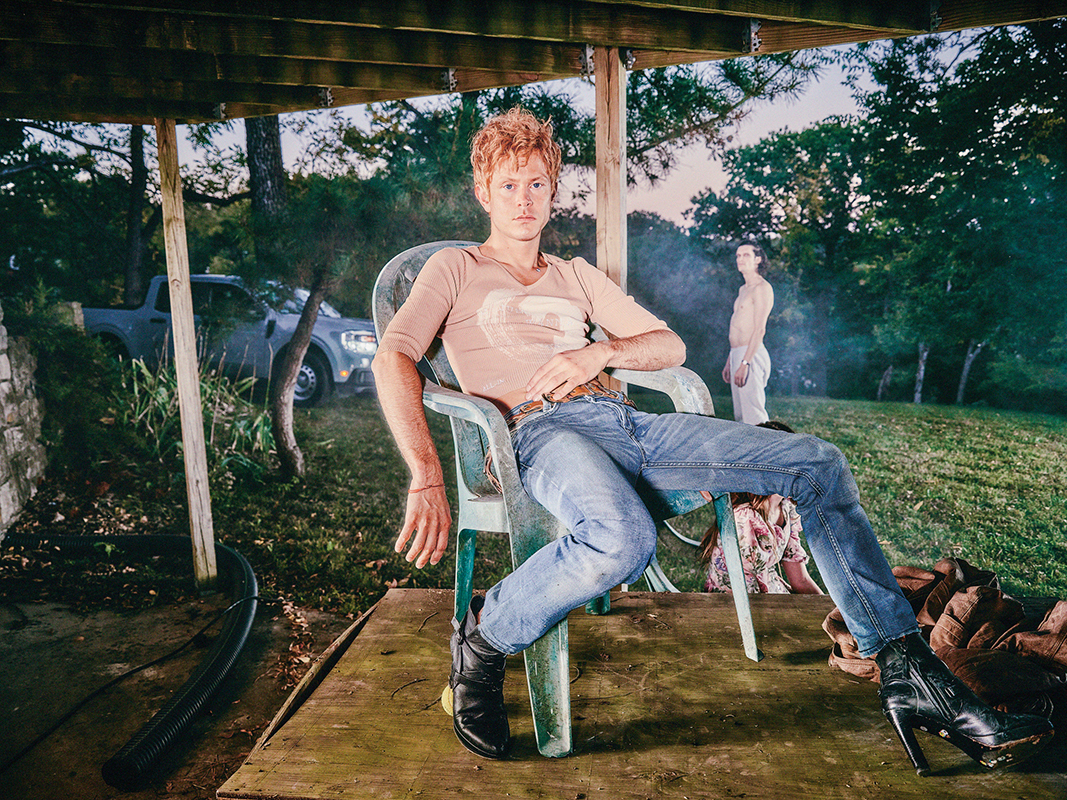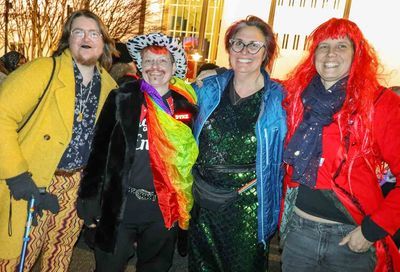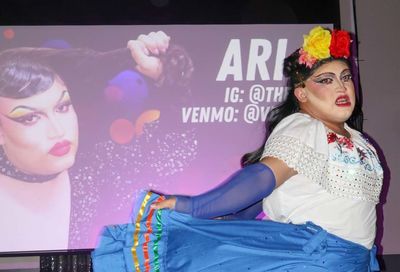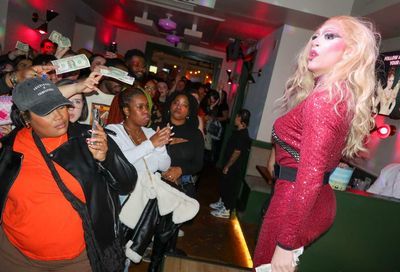Blown Up
Rich Morel & Bob Mould celebrate a decade of beer, bears and Blowoff beats

Rich Morel
(Photo by Todd Franson)
MW: A couple years into the party you started hitting major events on the gay calendar around the country.
MOULD: We went to Minneapolis for Pride weekend one year. We did a party at the Minneapolis Eagle. They had a big dance club in the basement. That was a big out-of-town trip. And I have a lot of history in Minneapolis. So it was funny for me personally to be going back to a town where I learned how to play punk rock but came back as a gay DJ. It was sort of weird.
By this time we were up in the main room at the 9:30 Club. When we went upstairs, I suggested that we get this big screen and do rear projection, because it seemed like a very pro-wrestling kind of thing to do. Nick Lopata got involved. Nick was doing a lot of film and video stuff. He came on board. So we started renting that huge screen that we still use to this day. That was a big thing. I don’t think that had been done that way in gay discos or the gay party world ever.
MOREL: We kept the DJ rig where it was, front and center, in front of the stage on the floor. And then that also closed the stage up immediately behind us as well, with the images and the visuals. It just gave the room a much tighter dynamic, and a more visual dynamic.
MOULD: And that’s when it really turned big. We were getting close to a thousand people as it was, but I think when we brought the visuals in, that really took it to a different level. I think that’s when people were like, ”Wow, we’ve never seen anything like this before. They’re not showing porn.” It’s very artistic, it was very tasteful. It was all conversational as well.
It went from this circular dance party, to then people were watching the visuals, and they were watching us DJ. And then I think we had to start DJ’ing a little more aggressively maybe. It was more like we were performing as DJs.
MOREL: Which is now the standard for DJs.
MOULD: Yeah, now when you go to see Calvin Harris or whoever DJ, they’re doing the same thing that we were doing.
MW: There are definitely people who go to Blowoff who prefer one style of music, or music mixed by one of you, over the other, whether it be Bob’s penchant for indie-rock or Rich’s progressive house base.
MOREL: Bob has said before, the beauty of the party is if you don’t like the set you’re hearing, it will change in an hour.
MW: Although you do have to pay attention to how the crowd is reacting.
MOULD: There’s a balance to that. If you pay too much attention – if you drop, oh say, Madonna, and people go bonkers, then you’re thinking, ”Oh wow, that’s what they want to hear.” There’s a fine line between playing what people want to hear and playing what you want them to hear. I think there are ways to do both and still have a pretty credible set, and a good set list at the end of the night. Of course you want to feel the vibe of the room, but you also don’t want to kowtow too terribly much to things. I like to think people come to listen to us because they trust our instincts with music.
MW: Have you heard stories of people meeting and dating as a result of Blowoff?
MOULD: Yes.
MOREL: Yes is the perfect answer!
MOULD: You get a lot of fun folks who show up at Blowoff. It would be hard not to have a good time, and possibly meet somebody. And then come back with them two months later.
MW: At the risk of getting too personal, both of you are in relationships, and both are with different partners than when you started Blowoff. Did either of you meet your current boyfriend at Blowoff?
MOREL: Yes, but a long time ago. It’s a long story that’s not worth getting into here, but yes.
MOULD: Mine would be a no, although my current partner did come to a Blowoff in 2003 as a friend. He was in town visiting me and my partner at the time. I knew him long before Blowoff started.
MOREL: [Laughs.] This party is getting way too confusing.
MOULD: [Laughs.] Yeah, and this is the part of the interview where it’s always uncomfortable.
MW: Why do you think there’s such a strong connection between Blowoff and bear culture, which have grown in leaps and bounds alongside each other?
MOREL: If you look at us, it sort of makes sense. It wasn’t a pre-thought – it was just who we were, and who we were hanging with was just a natural evolution.
MW: Bob, in your book you do talk about the first time you went to DIK Bar, where you essentially discovered your bear identity. This was after Blowoff had already started.
MOULD: Oh, my God, that was a magical night. [Laughs.] It was my bear coming-out night!
MOREL: Are you talking about Bear Happy Hour at the Dupont Italian Kitchen?
MOULD: Yes! Oh, my gosh! Yeah, it was back in ’04. I had heard about the bear thing, but it didn’t really jump up on my radar until I had been single for a couple months and was a little more wide-eyed about gay life and gay culture and gay history in general. So yeah, that worked out real well for me personally. There’s been bear culture for decades, there’s been gay club culture for decades. But maybe that idea of a big dance night where you can take your shirts off, maybe that wasn’t – I could be wrong – but maybe that wasn’t part of the bear culture before Blowoff. Maybe that was reserved for the classic, stereotypical twink, or the guys with abs, who want to be in clubs to take their shirts off. I don’t know. Does that sound like a possibility?
MOREL: That does actually sound about right. Especially if you’re looking back when we were first starting out, the guys and the vibe of it. It wasn’t conservative in a political sense, but it was a lot of guys who were coming to a club environment that probably hadn’t before, because they didn’t really like what was going on in the other clubs. And this was a club environment that they felt comfortable in, because of both the music and the crowd. It was a natural progression that people would start undressing.
MOULD: The more I think about it, I’m really proud of the more artistic approach that we brought to the culture, but if anything is to be remembered about the first 10 years about what Blowoff is, it’s this idea that we’re just coming up with now: It really freed up a lot of guys who were maybe self-conscious and didn’t fit in. It freed them up to have that experience that they saw and maybe weren’t having before.
MOREL: I think the music played a lot into it too, because we tapped into a lot of guys who really dug indie-rock and grew up on indie-rock. They liked pop music as much as anybody, but they also had this common bond over rock. So the combination of all of that, with the bear body image, just happened.
MW: Let’s talk about your individual music careers. Bob, let’s start with you. I know you made your debut on Letterman last year. Had you done other nighttime TV talk shows before that?
MOULD: Hüsker Dü was on Joan Rivers back in ’87. I was on MTV pretty regularly ’92, ’93, ’94 with Sugar. But as far as performing on network TV, not a whole lot.
MW: Is it harder to do than other types of performances?
MOULD: Letterman was wild because that’s that moment when you know that millions of people are watching what you do. You know it’s different from doing a show for a thousand people. It’s akin to being in a fistfight on the street. Because you just start and then three-and-a-half minutes later, you’re done. And you’re sort of looking like, ”What happened? Did I get my ass kicked? Did I knock somebody out?” It’s a really crazy adrenaline rush. I’ve played for a hundred-thousand people before and that’s one thing. But when you’re in a cold room with all these cameras pointing at you, and it’s going out to millions of people, it really does feel like you’re in a fight. I didn’t remember any of it.
Support Metro Weekly’s Journalism
These are challenging times for news organizations. And yet it’s crucial we stay active and provide vital resources and information to both our local readers and the world. So won’t you please take a moment and consider supporting Metro Weekly with a membership? For as little as $5 a month, you can help ensure Metro Weekly magazine and MetroWeekly.com remain free, viable resources as we provide the best, most diverse, culturally-resonant LGBTQ coverage in both the D.C. region and around the world. Memberships come with exclusive perks and discounts, your own personal digital delivery of each week’s magazine (and an archive), access to our Member's Lounge when it launches this fall, and exclusive members-only items like Metro Weekly Membership Mugs and Tote Bags! Check out all our membership levels here and please join us today!























